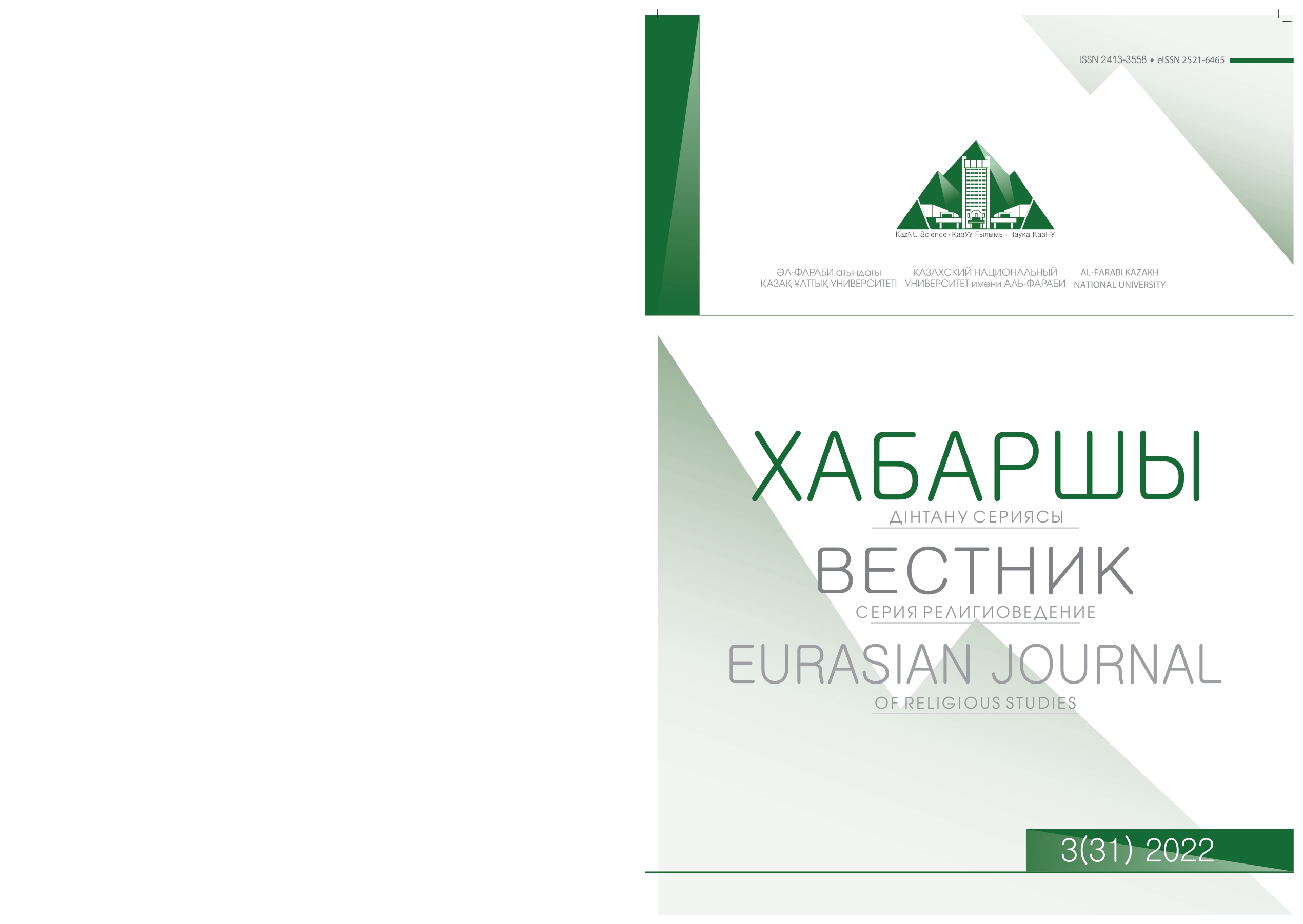Shihabuddin al-Alusi and Sufi aspects in his work "Ruh al-Magani"
DOI:
https://doi.org/10.26577//EJRS.2022.v31.i3.r1Keywords:
al-Alusi, Mufti, Writer, Sufism, IslamAbstract
The article deals with the life and work of Shihabuddin al-Alusi. In particular, the life of Shihabuddin al-Alusi, his creative path, teachers and students, family, and writings are described. In addition, the religious, political and social situation in the country where Shihabuddin al-Alusi lived. Also in the main part of this article, we see that Shihabuddin al-Alusi is a mujtahid scholar who is familiar with controversial issues of different sects and is a follower of the Shafi school, but in most cases he followed the Path of Abu Hanifa. Towards the end of his life he turned to ijtihad and from an early age he had a special interest in learning the mysteries of the Book of God, and from the age of thirteen he showed a keen interest in knowledge. At the age of five, he memorized the Qur`an, studied with famous scholars and, in turn, rose to the rank of Mufti, where he held special positions. His most valuable work Ruh al-Magani, which took 15 years to write, will also be discussed, which consists of 30 volumes. Shihabuddin al-Alusi began writing Ruh al-Magani at the age of thirty-four. It is also said that after his dismissal he began to write the book in full, but by that time several volumes of the book were published. Shihabuddin al-Alusi, in his explanations of his predecessors, was not just a narrator, but also a judge, a critic, and a researcher. He paid special attention to the events between the verses and the suras, stating the reasons for revelation in order to understand the verses in accordance with the reasons for their revelation.
Key words: al-Alus, Mufti, Writer, Sufism, Islam.
References
Al-Alusi, Abdulhamid Mahmud (1968) Mufessiren [Interpreter]. — Bagdad. – 41-85. (in Arabiс)
Al-Alusi, Mahmud Shukri (1929) al-Misk al-Аdfar [al-Misk al-Adfar]. — Baghdad. – 3-4-8-13-15-20-23-24. (in Arabiс)
Al-Baitor, Abdurazzak (1729) Haliyatu Bashari fi tarih al-Qorni salis al-ashar [Human ornament in the history of the thirteenth century]. Vol. 2. – 125. (in Arabiс)
Al-Kitani, Abdul Hay ibn Abdulkarim (1982) Mugjam al-Magajim al-Mumalhat ua Maslasalat [Thesaurus Dictionaries Timers and Serials] Dar al-Garb al-Islam. Vol. 1. – 140-267. (in Arabiс)
Al-Musawi, Muhsin J. (2010) Khaldi, Buteina. – Beirut: al-Markaz al-Saqafi al-Arabi. – 344. (in Arabiс)
Al-Yasugi, Luis Sheicho (1991) Tarih Adab al-Arabi [History of Arabic Literature] Qorn-19. Vol. 1/3. – Beirut: Dar al-Nashr. – 48-52-54-90/91. (in Arabiс)
Basheer Muhammad Nafi, Abu As-Sana al-Alusi (2002) An Alim, Ottoman Mufti, and Exegete of the Qur`an // International Journal of Middle East Studies. – Cambridge: Cambridge University Press. – 465-494. (in Arabiс)
Chukov B.V. (1989) Alusi Mahmoud Shihab Ad-Din [History of world literature]. Vol. 9. – Bagdad. - 695-697. (in Arabiс)
Chukov B.V. (1997) Keeping up with the century: A history of Arabic literature in Iraq. – M. – 75-84. (in Russian)
Chukov B.V. (2018) Iraqi literature of the first half of the XIX century. https://web.archive.org/web/20181118122756/http://feb-web.ru/feb/ivl/vl6/vl6-6952.htm
Eroglu Muhammed Alusi, Sehabeddin Mahmud (1989) Islam Ansiklopedisi [Encyclopedia of Islam] — Istanbul. – 551. (in Turkish)
Gharaib, Rihla ibn Batuta (1853) Tuhfat al-nazar fi Gharayib al-Amsar ua ajayib al-Asfar [The masterpiece of the beholder in the strangeness of the lands and the wonders of travel]. – New Cairo. – 25. (in Arabiс)
Hairaddin al-Zarkali (2019) Kitabu al-Alam [Flags Book] Vol. 1-3-7. – Istanbul. – 198. (in Arabiс)
Khalil, Mardam Beg (1971) Ayan al-qarn al-thalith ashar [Ian thirteenth century] — Beirut. – 49. (in Arabiс)
Muhammad Husein al-Zahbi (2000) Tafsir al-Mufassirin [Interpretation al-Mufassirin] Maktabu Uahbi. V 1. – Cairo. – 251. (in Arabiс)
Ruh al-Magani (1270) Tafsir al-Alusi [Interpretation al-Alusi]. – Damascus. V 1. 314. V 8. 12-46. V 11. 80. V 17. 3. (in Arabiс)
Umar, Rida Kahala (1993) al-Mugjam al-Muallifin [Dictionary Authors]. V 12. — Beirut: Dar al-Tali’a. – 175. (in Arabiс)




